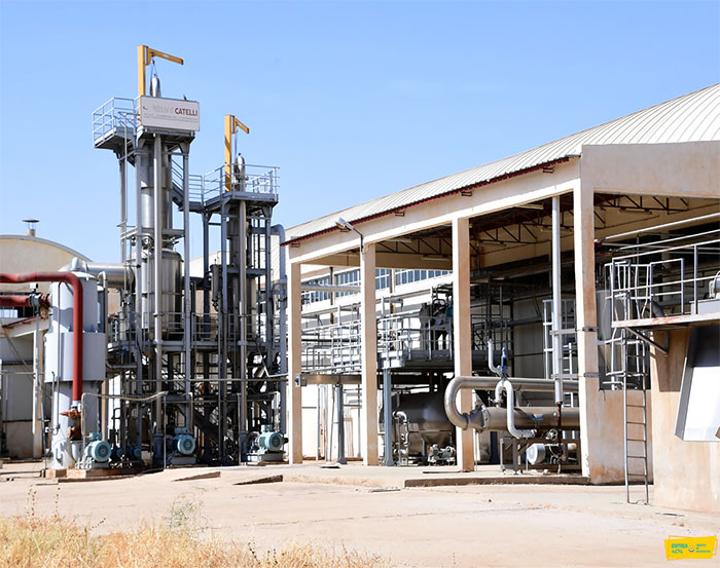Africa-Press – Eritrea. Along with the construction of major dams and the expansion of farms in the western development zone, in the Gash-Barka region, the need for the supply of electricity and the establishment of cold stores has become a necessity in the country’s efforts towards ensuring food security. Big generators have been installed in farms for the expansion of advanced irrigation systems and efforts have been made towards agro-industrialization that could be realized with electricity supply in the region.
As Eritrea’s development strategy relies heavily on its human resources, the country has been making huge investment in education to empower the youth. This has resulted in young and versatile graduates engaging in the implementation of development projects all over the country and making contribution toward nation building.
Eng. Israel Mengsteab works at the power plant in Kerkebet. After studying Electrical Engineering at Eritrea Institute of Technology (EIT) and graduated in 2019, he was assigned to work first in Fanko, then in Alebu and later in Kerkebet at the farm projects operated by Eritrea’s Crops and Livestock Corporation (ECLC). He has been working, along with other young graduates from vocational training centers, in the development of the power plant in Kerkebet.
Israel believes that working in remote areas enables one to develop the knowledge acquired in college through hands-on experience. For him, it is a win-win situation. He works for a better tomorrow and takes his assignment as an opportunity to enhance his competence through the implementation of various development projects.
Efriem Measho, head of the electricity supply unit in Kerkebet, studied electricity and mechanical works at Sawa Center for Vocational Training and got training in metal works in Alebu. There are now 13 staff members in charge of running the electricity supply to all farms in Kerkebet sub-zone.
The power supply projects in Kerkebet and Fanko were implemented using substantial input of graduates in electrical engineering who worked in the installation and expansion of electric supply in the farms. Efforts have also been made to provide electricity to the households.
Demoz Kebreab, head of electrical works in the western development zone, including Fanko and Kerkebet, said that electricity has been transforming agriculture and positively impacting the day-to-day activities of local communities. While the power plant in Fanko provides electricity to Teseney, Gherset, Fesko and Alebu, the one in Kerkebet serves Kerkebet farm, Sawa as well as Forto Sawa. The long term plan is to connect Golig and Omhajer using the power plant in Fanko and to extend the supply of electricity to a wider Gash-Barka region.
Mr. Demoz said that to upgrade the technical knowhow needed in running cold stores the ECLC assigned graduates in chemical engineering, horticulture and electrical engineering and gave a refresher course that ran for about 18 months to be able to efficiently run the cold stores. Since the cold stores need uninterrupted electric supply, the young graduates are always at the forefront in running and maintaining the power plants and the cold stores to ensure tons of perishable food stuff reach end users safely.
The cold store in Alebu, for instance, depends on the electricity supplied by the power plant in Fanko, but to ensure sustainability of the needed power supply a standby generator will be installed. Mr. Demoz reiterated that they are in a better condition because they now have the required technical expertise in running and maintaining the cold stores. He said that the young and committed college graduates continue to make a difference in many sectors. Graduates of Marine Engineering and Marine Biology have been playing major roles in running the cold stores. Currently, around 130 graduates of electrical engineering and electrical installation have been working at farm projects operated by the ECLC.
The establishment of cold stores in Alebu, Massawa and Adi-Guadad were triggered by the dynamic results of the farm projects in the western development zone. The cold stores are expected to hold fish, meat, fruits and vegetables from the farms in Kerkebet, Gerset, Fanko-Rawo, Fanko-Tsumu’e, Adi-Omar, Aligidier, Elabered, Halhale and other farm projects as well as fish from Northern and Southern Red Sea regions and fresh water fish from dams across the country.
The Gash-Barka region is the bread basket of Eritrea and the expansion of farm projects in the region has been increasing agricultural produce in the country. Considering the heat in the region, the establishment of cold stores will be extremely important in preserving meat, vegetables and fruits as well as fish and enabling safe transportation of quality produce to all parts of the country.
The cold stores established in various regions of the country are meant to be used to preserve agricultural produce not only from ECLC’s farms but also independent farmers who would like to use the facilities and be relieved from incurring loss due to lack of reliable stores. The cold store in Adi-Guadad, for instance, has been preserving fish from Massawa to be distributed in Asmara fish markets and the one in Alebu is meant to preserve supplies of meat, fruits, vegetables and fish to be distributed to markets across the country.







